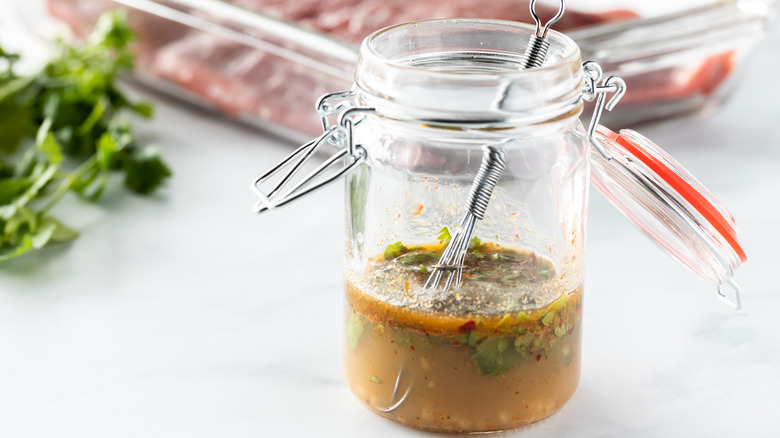Why It's Absolutely Crucial To Season Marinades
Good marinades are culinary magic, able to turn tough, lean flank steak into succulent, flavor-packed carne asada and transform chicken breasts from boring to the best grilled chicken you've ever had. It's a process inexorably tied to memories of late summer nights over a grill, but just as useful for tried and true weeknight staples like baked salmon. One of the easiest ways to pack your meals with flavor, there are a ton of different marinade options out there to experiment with that will work with almost any cuisine and preference.
Outside of their tenderizing, flavor-packing abilities, the other magic of marinades is how simple and customizable they are. Even the most inexperienced cooks can whip up a tasty marinade from scratch, which makes a world of difference. Don't just throw some meat in a plastic baggie with Greek dressing and call it a day; As long as you know the basic combination of fat, acid, and flavor, you can put your own spin on dinner in a matter of minutes (per Taste of Home).
But if you are making your own marinade, you'll need to know how — and why — to season it properly.
Seasoning marinades brings out the flavor
For marinades, there are a few potential sources of flavor you should explore, like salt and aromatics such as onion, garlic, herbs, and spices. According to The Spruce Eats, including the proper amount of salt in your marinade is essential because salt acts as a flavor booster for everything else. That paprika or lemon juice may add a little zip or zing to your marinade, but they can only do so much on their own.
Another big advantage of seasoning your marinade is that salt acts as a tenderizer, similar to a brine. Cook's Illustrated says that salt helps meat trap moisture, which will keep less fatty cuts of meat juicy and tender. Just remember that with marinades, balance and time are key. Taste Cooking warns that you don't want to over-salt or leave your meat in the marinade too long, as you could end up with a tough texture (which is exactly the problem you were probably trying to solve in the first place) or an unpleasantly ... well, salty flavor.
In addition to the perfect level of salt, a well-seasoned marinade should also have plenty of aromatics, which add depth to your dish. Bon Appétit suggests smashing, chopping, or bruising ingredients like garlic, herbs, and spices to help them release the maximum amount of flavor. Armed with this knowledge, you're well on your way to never serving up an underseasoned, dry meal again.

